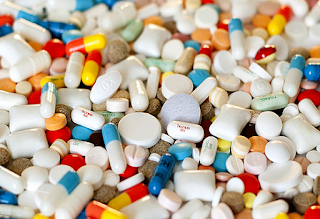Incredible and true: the placebo effect - The placebo effect is a mysterious thing. I have always been fascinated by the idea that something so inert and harmless as a sugar pill can ease the pain of a person or speed recovery with only the hope that it would.
Studies using placebo - an inactive treatment such as a sugar pill - in an attempt to understand the true impact of the active substance.
Comparing what happens to a group of patients taking the active drug with the results of those taking a placebo may help researchers understand how good is the active drug.
The word "placebo" comes from Latin and means "I will please." And "please" did. In study after study, many people taking a placebo improved program in your symptoms or condition.
The placebo effect is real
Recent research on the placebo effect only confirms how powerful it can be. - And the benefits of treatment with placebo are not just "in your head" measurable physiological changes can be observed in those who received placebo, similar to those seen in people who take drugs effective. in particular, blood pressure, heart rate, and blood test results were shown to improve subsets of research subjects who responded to placebo.
Of course, not everyone has a therapeutic response to a placebo. If that were the case, we would not need medication at all. Instead, we just could exercise the power of suggestion. Understanding why some people improve with placebo treatment and others are not the "holy grail" of research placebo.Nocebo: Placebo evil twinThe power of suggestion is a double edged sword. If you plan a treatment to help you, they are more likely to do so. And if you expect to prejudicial treatment, it is more likely to feel the negative effects. This is called "nocebo effect" (Latin for "I will harm").
For
example, if you tell someone that a headache is a common side effect of
a particular drug, that person is more likely to report headaches, even
if they are actually taking a placebo. The
power of expectation is great and probably plays an important role in
the benefits and side effects of commonly prescribed drugs.
It is the power of the placebo effect increases?
A new fascinating study examined the impact of the placebo effect in 84 trials for treatment of nerve pain that occurred over the last 23 years. The researchers found that the placebo effect has become much stronger, but this observation was seen in US studies.
What for? One theory is that the flow of direct to consumer advertising of drugs in the United States (which is banned in most other countries) raises expectations of a drug to help patients. Stronger and expectations of a drug can lead to a greater placebo effect efficiency.
Another theory links the increased effectiveness of placebos to test their own research: the largest, most expensive and most elaborate judgment, plus expectations of study participants. Analyses of this type tend to be more common in the US than elsewhere.
Whatever the reason, there is a downside to this trend. A powerful placebo effect makes it more difficult for the researchers show that a new drug works. The stronger the placebo effect, it becomes more difficult to show a significant difference between the placebo and active drug - even if the active drug is quite good. Consequently, some effective drugs can "fail" in clinical trials. And that could lead researchers to spend their education outside of the US
What future?
Research on the pros cons of the placebo effect has changed the number of people think about this phenomenon. We used to think that the placebo effect is limited to those influenced disease-free "real"; Now we know better. But there is much that remains a mystery. We do not know how to predict who will respond to a placebo or how to reliably operate their power.
And it is important to note that while "feeling better" is important, they do not always come with genuine health benefits. For example, some study subjects who took a placebo for asthma
reported improvement of their symptoms but their lung function measures
are not really better.
Yet
the day will come when a better understanding of the placebo effect
and, in appropriate circumstances, which are used effectively in
clinical practice. Like
many people either do not respond to standard medications or have
unpleasant side effects, that day can not come soon enough.
By: Robert Shmerling, M.D.
12/02/2015
Home »
Addiction
,
Allergies and Asthma
,
Disease and medicine
,
Disease treatment
,
Medical research
» Incredible and true: the placebo effect













0 komentar:
Post a Comment
"Thank you for visiting my blog, please leave a comment in the space provided."